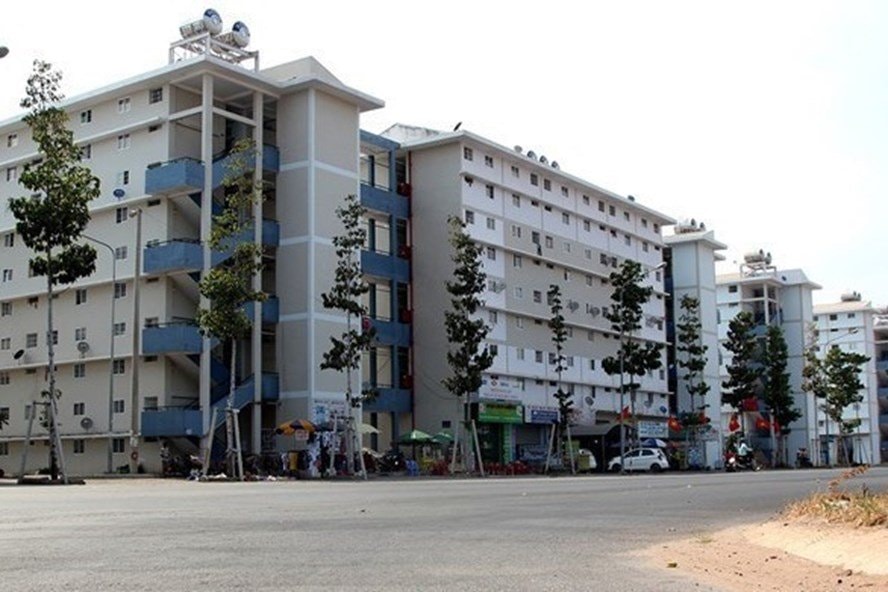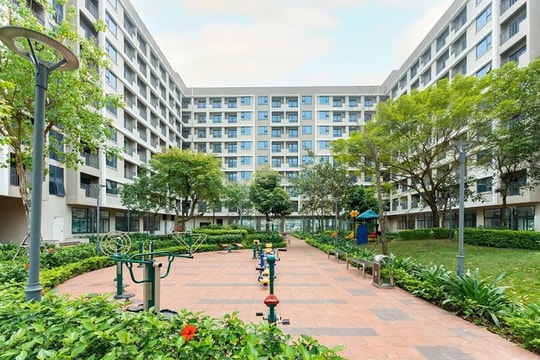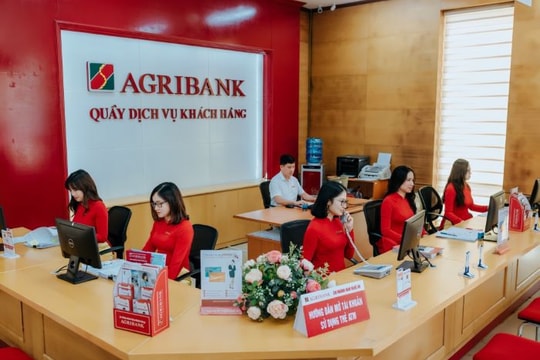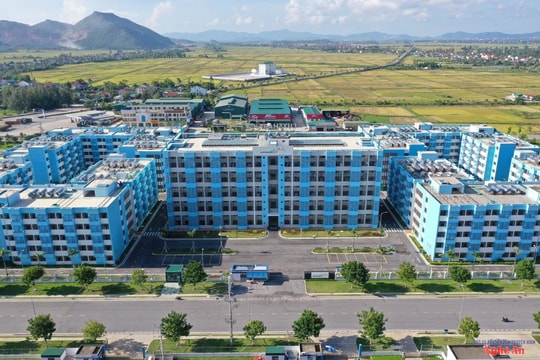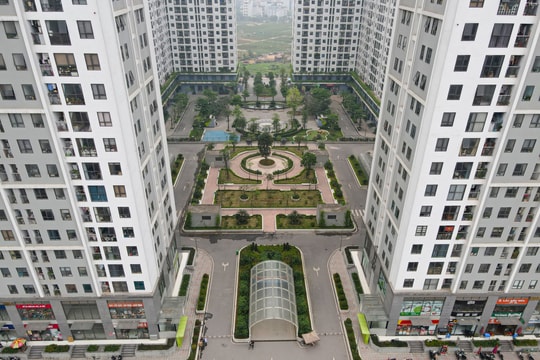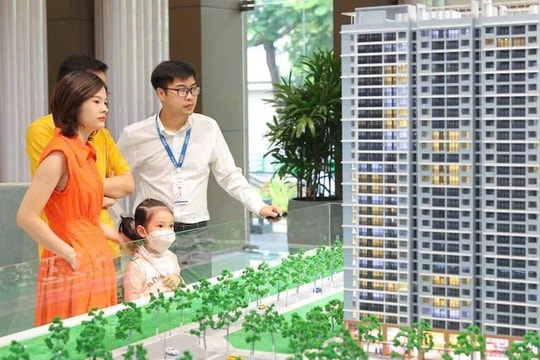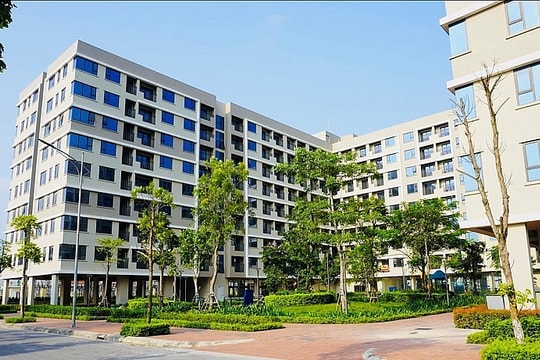"Broken" social housing program
The VND30,000 billion credit support package has helped thousands of low-income people find a place to live. However, the disbursement of this package stopped on June 1, 2016, causing many homebuyers to think about giving up their dream of owning a home because they cannot afford to repay the loan at commercial interest rates.
Many businesses specialize in constructionsocial housing(NƠXH) also lamented falling into a serious shortage of capital when not having access to preferential credit sources.
Stuck due to lack of capital
Nearly 100 customers who bought the social housing project at 35 Ho Hoc Lam, Binh Tan District (HCMC) are in a dilemma because the project investor, Hoang Quan Real Estate Company, lacks capital, so the project is not known when it will be handed over. Meanwhile, many people are drowning in debt, having to sell all their assets at home to pay the monthly interest to the bank to buy social housing.
Responding to the delay, Hoang Quan Real Estate Company said that the company has a total charter capital of up to 5,000 billion VND. However, due to the simultaneous implementation of 24 social housing projects, plus the 30,000 billion VND support package for social housing loans, the company has been seriously short of capital. The company has been using its own capital to cover expenses, share interest with buyers, and accept that social housing business profits will decrease and be limited to the maximum extent.
|
| For the social housing program to be effective, there needs to be a stable source of support funding. |
With no solution to finding capital, the investor can only call on customers to lend the remaining capital to speed up the progress. Or propose to the People's Committee of Ho Chi Minh City to allow the use of money from the Housing Development Fund to build social housing. Even if the above solutions do not work, the investor will consider the last option of returning the project to the State.
Also falling into a similar situation, recently, more than 700 customers who bought social housing at the AZ Thang Long Social Housing and Commercial Service Complex Project (commercial name is Bright City) in Kim Chung commune (Hoai Duc district, Hanoi) sent a petition for help to the Government and the Ministry of Construction, reflecting the project's slow handover of houses, causing them to fall into a difficult situation.
And explaining the reason for the project's delay, the project's investor, Thang Long Confectionery Company Limited, said that the AZ Thang Long project was being implemented on schedule when it encountered a major policy force majeure incident, which was the suspension of the nationwide VND30,000 billion loan package.
According to this investor, because there are no more preferential interest rates, customers are no longer interested in the project while the investor is facing difficulties when having to borrow investment capital from banks with high commercial interest rates. After the 30,000 billion VND package stopped being implemented, up to now, more than 1.5 years have passed since the Government and the State Bank issued a series of guiding documents for the new preferential loan package for social housing at the Vietnam Bank for Social Policies (VBSP), but until now there is no capital, everyone has to wait.
Support capital is like a drop in the ocean
According to the Ministry of Construction's statistics, the demand for social housing nationwide in the period from 2011 to 2020 requires about 440,000 apartments. However, according to the implementation results of localities, so far only about 28% of the plan has been implemented. In Ho Chi Minh City alone, according to the Department of Construction's social housing development plan, from 2017 to 2020, the city will develop 39 projects with a scale of 45,000 apartments.
Meanwhile, according to calculations, the demand for social housing by the city's residents by 2020 will be 81,000 units. The above statistics show a huge "gap" between supply and demand for social housing in the most populous city in the country. Although the demand for social housing is very high, the ability of businesses to meet it is still very modest. Up to this point, statistics show that social housing is still absent from the real estate market of Ho Chi Minh City.
The main reason for the slow progress of social housing development, with many difficulties and bottlenecks, is the inability to arrange budget capital to implement social housing support policies according to regulations. According to information from the Social Policy Bank, it officially launched loans to buy social housing last April.
Accordingly, in 2018, the Government will provide the Social Policy Bank with 500 billion VND and the bank will mobilize another 500 billion VND. Thus, this year, the bank will have a disbursement source of 1,000 billion VND. However, in a document sent to the Prime Minister, the Ministry of Construction said that up to this point, the amount has not been disbursed. On the other hand, if this amount is disbursed, it will only be lent to households and individuals, while project investors will not be able to borrow this capital source.
Meanwhile, reports from localities show that there are currently 206 social housing projects with a construction scale of about 168,700 apartments, total area of about 8,435,000m2 that are behind schedule or temporarily suspended due to lack of capital to continue implementation.
Even the people can access this loan source is not too easy. According to calculations, the capital source of 1,000 billion VND of the Social Policy Bank will be allocated to localities to implement the loan. In which, Hanoi and Ho Chi Minh City are allocated the largest capital source, each place 50 billion VND.
Other cities are allocated from 10 billion VND or less depending on the conditions of each locality. In big cities like Hanoi or Ho Chi Minh City, the allocation of 50 billion VND, on average, the loan amount for social housing purchase, only about 150 people can access this preferential loan source. This is no different than a drop in the ocean.
Dr. of Economics Truong Huy Mai (RMIT) said that according to calculations, the capital demand for social housing is about 5,000 billion VND, so the State needs to have some additional source, because 1,000 - 2,000 billion VND to implement compared to the demand is too little. To have capital for social housing development, a more fundamental solution is needed, instead of just relying on capital support packages from the State.
For its part, the State needs to take the lead in organizing implementation. If it only calls for and calls for capital from outside the society, it will be difficult. The demand for social housing is always high, so even if there are no capital incentives from the State, when investing in this segment, businesses will still not be unprofitable.
However, because home buyers cannot access low-interest capital, have to borrow commercially with double interest rates and many other strict conditions, their ability to access housing is reduced. At that time, businesses must support interest rates for home buyers within a certain period, so their profits are limited to the maximum. This is not a small barrier, Dr. Truong Huy Mai analyzed.

